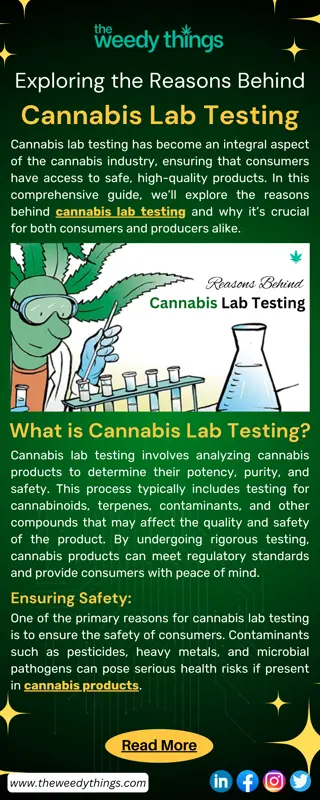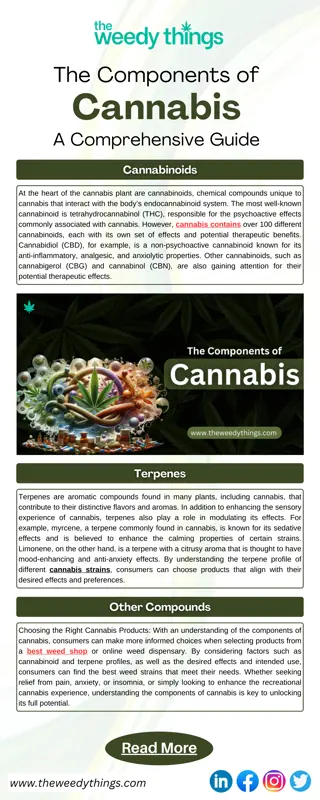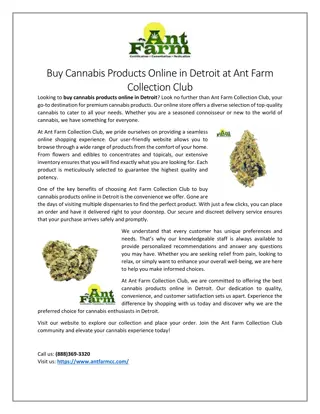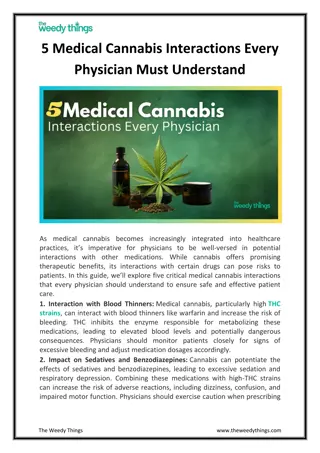Arkansas Cannabis Laws and Employment Issues
Explore the implications of the Arkansas Medical Marijuana Amendment on cannabis management, employee-related concerns, and waste disposal. Learn about regulations, employer responsibilities, and legal aspects surrounding medical marijuana in the state. Dive into topics like cultivation regulations, waste disposal requirements, and federal vs. state laws concerning marijuana.
Download Presentation

Please find below an Image/Link to download the presentation.
The content on the website is provided AS IS for your information and personal use only. It may not be sold, licensed, or shared on other websites without obtaining consent from the author.If you encounter any issues during the download, it is possible that the publisher has removed the file from their server.
You are allowed to download the files provided on this website for personal or commercial use, subject to the condition that they are used lawfully. All files are the property of their respective owners.
The content on the website is provided AS IS for your information and personal use only. It may not be sold, licensed, or shared on other websites without obtaining consent from the author.
E N D
Presentation Transcript
Cannabis Laws and the Future of Cannabis Management (Including Employee Issues) 2021 Arkansas Recycling Coalition Conference and Tradeshow 1
Walter G. Wright wwright@mwlaw.com Stuart Spencer sspencer@mwlaw.com Cara Butler cbutler@mwlaw.com 2
Arkansas Environmental Energy and Water Log Blog http://www.mitchellwilliamslaw.com/blog Three combined posts every business day addressing federal/Arkansas legislation, regulation, administrative/judicial decisions and personnel transitions 3
Topics to be Addressed: What does the Arkansas Medical Marijuana Amendment provide? How are the cultivation and processing facilities regulated from an environmental and safety standoint? What are the rules applicable to medical marijuana waste? - Marijuana waste itself - Marijuana waste such as solvents, oils, etc., generated in processing activities. The various employer/employee issues raised by a workforce that can now legally ingest marijuana if they meet certain criteria (and how to address these issues) 4
Therefore, we will discuss key employment issues. We also will focus on issues associated with marijuana waste disposal such as: Waste generated (variety of wastes may be generated) Disposal/treatment activities Potentially applicable federal and state environmental legal requirements Contract Issues/Allocation of liability associated with disposal 5
Medical Marijuana Constitutional Amendment Decriminalizes (from a state [Arkansas] standpoint) certain use of marijuana Establishment of regulation of cultivators and dispensaries Does not require Employer to accommodate the ingestion of marijuana in a workplace or an employee working under the influence of marijuana. Outlines process pursuant to which an individual can become a Qualifying Patient who can use medical marijuana Doctor certifies he/she has a Qualifying Medical Condition 6
Marijuana is still illegal at the Federal level DEA Schedule I controlled substance Substances in this schedule have no currently accepted medical use in the United States, a lack of accepted safety for use under medical supervision, and a high potential for abuse Obama Administration Attorney General relaxed federal enforcement Trump Administration sending mixed messages What will Biden Administration do? 7
Arkansas passage of the Arkansas Medical Marijuana Amendment ( AMMA ) of 2016 set in motion fast-paced efforts to put in place rules that will allow the cultivation, processing, dispensing, and purchase of marijuana for medicinal-related consumption. Cultivation and dispensaries operating across the State of Arkansas Thousands of registry cards issued by Arkansas Department of Health The legalization of certain uses/cultivation of marijuana in Arkansas is generating a host of legal issues including healthcare, insurance, banking, OSHA, etc. 8
This is arguably particularly difficult for many employers in the solid and hazardous waste and recycling industries because of serious safety and environmental issues: Exposure to heavy machinery and dangerous processes May be long commutes to some facilities in a rural state such as Arkansas Presence of hazardous materials requires vigilance More difficult to find young employees because of strict drug policies 9
Medical Marijuana Other laws create further confusion Federal American Disabilities Act Federal Drug Free Workplace Act of 1988 State Workers Compensation laws Federal Department of Transportation Regulations 10
Presentation will identify issues that employers might consider in view of potential employee use of medicinal marijuana. They may include any number of issues involving both job applicants or current employees. Suggestions for addressing issues arising out of medicinal use of marijuana in the employment context are provided. First, we will discuss the environmental and other regulatory issues associated with these facilities Including impacts from an energy and water standpoint 11
Arkansas Agencies that Oversee Medical Marijuana Arkansas Medical Marijuana Commission (authorizes cultivators, processors, and dispensers) Alcohol Beverage Control ( ABC ) Arkansas Department of Health ABC administers regulations addressing facility security, packaging, qualify control, structure design, etc. and disposal of medical marijuana wastes DOH addresses doctor certifications, qualifying patients, etc. 12
State Regulation Non-Hazardous (RCRA) Marijuana Plants waste (including stalks, roots/soil) and unusable marijuana Examples: - Trim (leaves and other materials removed during a harvest - Shake (leaves fall off naturally) Grow Medium 13
ABC Regulations RR 18.1 Disposal of Marijuana by Cultivation Facilities and Dispensaries. All medical marijuana waste shall be disposed of in accordance with this rule. a. All medical marijuana waste shall be stored in a secure, limited access area on the premises of the cultivation facility or dispensary. b. All medical marijuana shall be rendered unusable pursuant to the methods set forth in this rule prior to disposal. c. All steps taken to render the marijuana unusable shall be conducted under video surveillance by the licensed facility s video surveillance system d. All medical marijuana waste set for disposal shall be properly weighed and recorded in the Inventory Tracking System. 14
e. A cultivation facility or dispensary shall notify the Division at least three (3) business days prior to rendering the medical marijuana waste unusable and disposing of it. The notification shall include the weight of the marijuana to be rendered unusable f. Medical marijuana shall be rendered unusable by grinding and incorporating the cannabis plant waste with other ground materials so the resulting mix is at least 50% non-cannabis waste by volume. Division is a reference to ABC 15
g. Medical Marijuana waste rendered unusable by the methods described in section (2), may be delivered to a permitted solid waste facility for final disposition. Permitted solid waste facilities may include: Compostable Mixed Waste: Compost, anaerobic digester, or other facility approved by the Division Noncompostable Mixed Waste: Landfill, incinerator 16
The following acceptable materials may be combined with cannabis plant waste: i. Compostable Mixed Waste: Cannabis waste to be disposed of as compost, feedstock, or in another organic waste method may be mixed with the following types of waste materials: 1. Food waste; 2. Yard waste; 3. Vegetable based grease oils; 4. Agricultural Materials 5. Biodegradable products and paper; 6. Clean wood; 7. Fruits and vegetables; or 8. Plant matter. 17
ii. Noncompostable Mixed Waste: Cannabis waste to be disposed of in a landfill or another disposal method, such as incineration, may be mixed with the following types of waste materials. 1. Paper waste; 2. Cardboard waste; 3. Plastic waste; 4. Soil; 5. Nonrecyclable plastic; or 6. Broken glass. 18
Medical Marijuana Wastes? Examples from these categories Trim and solid plant material used to create an extract Waste solvent (example Butane making concentrates via hydrocarbon extraction) Laboratory waste Extract that fails to meet quality testing Used reactants Residual solvents include butane, hexane, alcohol, and ethanol which are byproducts of extraction 19
Medical Marijuana Wastes? Examples (cont.) from these categories Alcohols Residual pesticides/fertilizers CO2 cartridges Cleaning solution Lighting ballasts Hydroponic waste - Nutrients (significant phosphorous, nitrogen, calcium and zinc) - Wastewater Light bulbs ([mercury] grow lights) 20
Energy Issues A significant topic in states already allowing cultivation is the energy impact of cultivation. 2000-3000 Kilowatt hours of energy per pound of product. (NPCC) The publication Utility Dive quotes Mr. Pete Rumsey, Executive Vice President of Business Development at Lighting Science, who states: Cannabis is one of the most energy-intensive industries in the world. Statistics show that one percent of all electricity used in the United States today is used by indoor marijuana growers, to the tune of almost $6 billion annually. The same publication notes that growing four mature marijuana plants consume about as much power as running 29 refrigerators around the clock. 21
Energy Issues Why are cultivation facilities motivated regarding energy conservation? Highly competitive industry Margins decreasing Energy is one of the largest cost components for cultivation/infusion facilities 22
Energy Issues (cont.) Energy is consumed by cultivation activities and processes such as: Intense lighting (10,000 watt grow lights) High pressure sodium Ceramic metal halide Light emitting of diode Continuous air conditions (climate control) Intricate ventilation systems Water pumps and purifiers Heaters for drying and curing marijuana Extraction equipment filters State of the art security measures CO2 injection High powered compressors (extraction) 23
Water Use Cultivating and processing marijuana is water intensive. A facility tapping into a public utility or municipal water line if among a concentration of such facilities could be a material issue in terms of quantity used. For purposes of producing high marijuana yields influent water may be scrutinized for: Total soluble salt Proportion of sodium cations Excessive concentrations of elements that curves toxicity on ionic imbalance in plants Bicarbonate anion concentration as related to calcium plus magnesium cations 24
Wastewater Wastewater utilities will need to evaluate cultivating/infusion facilities wastewater streams. Scrutinize pollutant concentration Nutrient issues (Phosphates and Nitrates) Biocides interfere with treatment Facility practices to address potential wastewater issues Available agronomy practices to reduce pollution Minimize/use best practices for reducing solvent usage for processing plant material Recirculating hydroponic system Address/sewer entry points in cultivation rooms 25
Wastewater (cont.) Infusion/Extraction/Production Relevant pollutants? Prevent gaseous solvents like carbon dioxide, propane or butane discharging into sewer system wastewater Solvents such as hexane, etc., maybe flammable Fats, oils, and grease from edible production High concentration or improper use of cleaning agents 26
Air Odors (release of VOCs) from cultivation/processing (odor control plans are required such as carbon filtration, etc.) Emission of volatile organic compounds associated with extractions and infusions Fermentation to produce C02 to accelerate plant growth (creating CO, nitrogenoxides, PM, S02 and VOCs) Natural Gas Fired Boilers/Emergency generators 27
Service/Disposal Agreements Potential liability for improper disposal of medical marijuana wastes Allocate liability in service agreements Generator warrant/certification waste meets definition of unusable Use of waste profile Provisions for indemnity, rejection, expense for sending back, etc. Note: Landfills operating procedures may consider need for immediate burial, etc., to prevent scavenging. 28
Potentially Applicable Environmental/Safety Regulatory Requirements Not Specific to Marijuana (but may affect these facilities and wastes they generate) 1. Pesticides/Fungicides/Insecticides/Herbicides Restrictions a. Utilized in various stages of cultivation and processing b. Labeling/use restrictions/requirements i. Federal Insecticide Fungicide Rodenticide Act ( FIFRA ) ii. States Implementing/Enforcing FIFRA regulations 2. State Air Requirements a. Permitting i. Potential Emission Sources A. Boilers/Generators/Heating Units B. Processing/Use of Solvents for Extraction (volatile organic compounds) b. Odor Issues 29
3. Solid Waste Management Requirements a. Restrictions on availability of composting for marijuana-related vegetative material and used plant growth soil b. Restrictions on availability of landfills, transfer facilities, or transport for marijuana-related waste solid waste such as 4. Hazardous Waste Management Requirements a. Marijuana processing and cultivation activities can generate hazardous wastes (discarded solvents, chemicals, etc.) triggering Resource Conservation and Recovery Act ( RCRA ) Subtitle C (or state equivalent) requirements 30
5. State Wastewater Requirements a. Clean Water Act/National Pollution Discharge Elimination System permits for direct discharges from cultivation/processing structures into waterbodies b. Clean Water Act/Pretreatment Requirements imposed on cultivation/processing structures discharging into municipal wastewater treatment plants 6. Fire Codes a. National Fire Protection Association i. National Fire Protection Association ( NFPA ) task group developing specific Chapter for cultivation/processing facilities ii. NFPA draft report issued in Fall 2016 titled Marijuana, Growing, Processing and Extraction Facilities iii. NFPA 58 (Liquefied petroleum gas) b. Local/State Fire Codes 31
Arkansas Amendment Details Qualifying Medical Condition Cancer Glaucoma HIV/AIDS Hepatitis C ALS Severe Arthritis Crohn s Disease Ulcerative Colitis PTSD Tourette s Syndrome Fibromyalgia Alzheimer s Disease 33
Arkansas Amendment Details Qualifying Medical Condition (cont.) Also includes chronic or debilitating diseases with enumerated severe symptoms including: Intractable Pain Severe Nausea Severe Muscle Spasms Seizures 34
Next Steps If a physician provides a written certification of a qualifying condition, the qualifying patient can use the certification to obtain a registry identification card from the Arkansas Department of Health Once the Qualifying Patient Obtains a Registry Identification Card, he/she can purchase and possess up to 2.5 ounces of marijuana without threat of criminal prosecution or adverse state actions 35
Arkansas Amendment Non-Discrimination Provision Some job applicants and employees may produce a medical marijuana registry ID card approved by the Arkansas Department of Health in response to a failed drug test. 36
Arkansas Amendment Non-Discrimination Provision (Cont.) Non-compliance with the Arkansas Medical Marijuana Amendment of 2016 (AMMA) can pose significant risks for an employer. It includes a non-discrimination provision directed at employers. The provision provides that: o An employer shall not discriminate against an applicant or employee in hiring, termination, or any term or condition of employment, or otherwise penalize an applicant or employee, based upon the applicant s or employee s past or present status as a qualifying patient or designated caregiver. 37
Arkansas Medical Marijuana Act Non- Discrimination Provision (Cont.) Damages under the AMMA for an employment discrimination claim based on an applicant s or employee s past or present status as a qualifying patient or designated caregiver is capped in accordance with the statutory caps in the Arkansas Civil Rights Act. Liability for back pay is limited to no more than two years prior to the filing of an action and the period within in which an applicant or employee can bring such an action is one year from when the alleged discrimination occurred. 38
Arkansas Medical Marijuana Act Non- Discrimination Provision (Cont.) What if your employee has a registry card? Two straightforward conclusions: o There is no protected right either from the state or federal government to be under the influence in the workplace. o Off-duty consumption of marijuana without a registration card still illegal o Reasonable suspicion testing The rest of the questions are more difficult. 39
Systemic Marijuana Side Effects (THC) Short-term memory problems Impaired thinking and ability to perform tasks requiring mental alertness Loss of balance and motor function (e.g., coordination) Decreased ability to concentrate Changes in sensory perception Decreased reaction time Increased heart rate Increased blood pressure Dry mouth Increased appetite, thirst Drowsiness Anxiety, insomnia, panic attacks Hallucinations 40
Unique Properties of Marijuana Carry-over impairment effect Slow rate of metabolization Remains in system for extended period Easily accessible Pervasive unlawful use High rates of chronic and habitual use 41
General Concerns What do we mean by medical marijuana ? What would be permissible? Oil? Edibles? Smoked? Could impact workplace policies on: Smoking Possession at work Whether it can be consumed during work time 42
Safety Still Important Costs of ensuring safe workplaces continue to escalate, including due to risks such as distracted driving, increased driving time, faster production demands, etc. Industrial, manufacturing and energy facilities have particularly complex operations including those relating to protection of environment, health and safety. More injuries means increased workers compensation, unemployment, and litigation costs 43
Employer Issues Costs of drug-testing applicants, employees Increased management training costs Increased need for supervision, oversight 44
Key Questions Faced by Arkansas Employers Do employers continue to enforce their traditional substance-abuse policies, or adopt a new approach for dealing with employees who test positive for marijuana in the workplace? Does the Americans with Disabilities Act (ADA) protect employees who claim discrimination based upon their use of marijuana for a disabling medical condition? (Yes) 45
Key Questions Faced by Arkansas Employers (Cont.) Do employers violate the Occupational Safety and Health Administration s (OSHA s) General Duty Clause by allowing employees who use marijuana to perform safety-sensitive jobs, and thereby create a workplace hazard that OSHA standards seek to eliminate? (irrelevant fun fact note use of drones by OSHA and LA DEQ Do the Department of Transportation s (DOT s) substance-abuse regulations trump state marijuana laws? (Yes) 46
Key Questions Faced by Arkansas Employers (Cont.) Heightened level of concern when claimant returns to a safety-sensitive occupation, such as driving or construction, while subject to potential adverse cognitive and psychological effects of marijuana? Quantification of the amount of marijuana consumed by claimant is not available through urine medication testing, thereby limiting ability to determine if he or she has consumed prescribed dose, or is in fact acutely intoxicated 47
Key Questions Faced by Arkansas Employers (Cont.) Can an employer ban the use of marijuana by an employee if it is permitted by state law - and if the employee has a prescription? Does an employer have the right to terminate an employee who tests positive for marijuana, even if the employee shows no signs of impairment on the job? 48
Conclusions Employees shown to be impaired on the job may be disciplined and discharged by an employer. As we will discuss, Federal government contractors/grantees subject to the Drug Free Workplace Act of 1988 should continue to follow all of the requirements of the Act, even in states permitting marijuana use by employees Employers subject to Department of Transportation HAZMAT rules must recognize the continued ban of marijuana use. 49
What Should Employers Do? Establish a Drug Free Workplace o Note: qualified medical marijuana users can still be employed Make jobs with specific safety sensitive tasks or related to public health Have a way of tracking job performance Have an action plan for how you will respond to an employee who is a medical marijuana user 50























